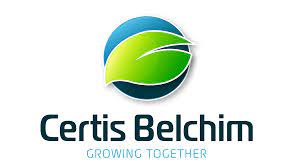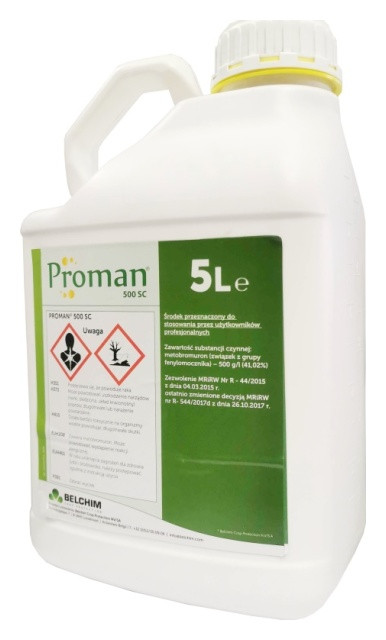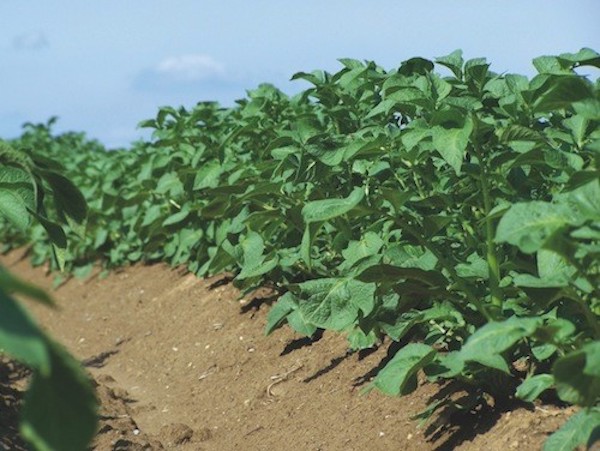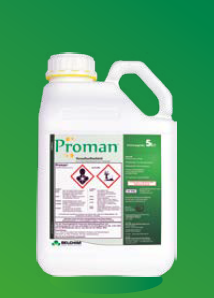Product information "Proman"
Soil herbicide intended for the control of annuals
of broad-leaved and some annual narrow-leaved weeds in
potatoes, soybeans and sunflowers.
Active substance: metobromuron........... 500 g/l
Formulation: concentrate for suspension (SC)
Application and basic characteristics
PROMAN is registered for use before potato emergence (for
the time of spraying can sprout a maximum of 10-20% of potatoes) in quantity
2.5 to 4 l/ha, before soybean sprouting in the amount of 2-3 l/ha and before sprouting
sunflower in a dose of 2-3 l/ha. Doses depend on soil texture.
On heavy soils, higher doses are used, and lower doses are used
on light soils.
In potatoes, soybeans and sunflowers because of the monotonous and limited selection
herbicides, problems with certain weeds are emerging more and more.
PROMAN is a highly flexible herbicide that:
• Works on a very wide range of weeds (broad-leaved and narrow-leaved)
• Works on stubborn weeds such as:
Ambrosia artemisiifolia, Abuthilon theophrasti, Solanum nigrum,
Xanthium strumarium
• It is an ideal partner for combining with other herbicides.
Potato. PROMAN is a key member of Belchim's POTATO PRO
protection program. For the protection of potatoes Belchim on the basis
tests in Europe and in Croatia as the best solution for suppression
of annual broad-leaved and narrow-leaved weeds suggests a combination of:
2.5-3 l PROMAN + 0.2-0.25 l CLEMATIS
- if necessary, it can be combined with herbicides based on pendimethalin
- there are no problems with selectivity as is the case with metribuzin
- PROMAN and metribuzin (combined with a substantially reduced dose) can also be quality partners.
In the intensive production of potatoes in Western Europe, potato producers use two each year
up to four herbicidal active substances, because this is the only way they can satisfactorily suppress weeds.
In the most important countries for potato production in Western Europe, PROMAN has proven to be
the most flexible partner for other herbicides.
Soy. The registered dose of PROMAN in soybeans is 2-3 l/ha and primarily depends on the type of soil (which
the lighter/sandier the soil, the lower the dose). Excessive doses of PROMAN in soy, especially in
intense rainfall, can cause transient phytotoxicity. PROMAN is perfectly combined with
other herbicides. For advice on combining, contact Agrimatc agronomists in the field.
PROMAN is a key herbicide for application in soybeans before the emergence of crops and weeds:
- enables the unhindered development of the crop and protects the crop from dangerous weeds such as ragweed from the beginning
and other weeds
- spraying before emergence allows targeted corrective spraying after emergence in just one time
pass, and that in a longer time interval, because the weeds of the subsequent ponika due to spraying earlier
sprouts develop more slowly. For advice on corrective spraying, ask for advice from Agrimatc's agronomist
services in the field (suitable active substances are imazamox, bentazon, graminicides).
Sunflower. The dose of PROMAN in sunflower is 2-3 l/ha and primarily depends on the type of soil (which are soils
the lighter / sandier the dose is smaller). PROMAN combines well with other herbicides. For advice
about combining, contact Agrimatc agronomists in the field. PROMAN enables smooth
crop development and from the beginning protects the crop from dangerous weeds such as, for example, ambrosia.
Proman is a soil herbicide.
For a good effect, the active substance must be evenly represented in the moisture of the upper layer of the soil.
This means that the soil must be prepared in an even clod, and the top layer of soil must be
sufficiently compact to be within reach of capillary moisture from the deeper layers of the soil and yes
it retains rainwater well during rain. Improperly cultivated soil makes it impossible
satisfactory activation of the active substance as well as action on weeds that can sprout from deeper
layers of soil where moisture is available to the plant.
Proman is a soil herbicide, which is why its action is influenced by the specific characteristics of the soil
as well as weather conditions. In certain extreme situations - very light soil, very heavy rains
and very low content of organic matter, in order to prevent phytotoxicity it is necessary to adhere
the following:
Potato:
On very light sandy soils (sand fraction content higher than 65%) and with low organic matter
matter (< 1.5%), a maximum dose of 2 l/ha is recommended. On such lands, especially in
in cases of very heavy rains, higher doses increase the risk of phytotoxicity.
Soy and sunflower:
Recommendations for avoiding the risk of phytotoxicity:
• Spraying before emergence
• Desirable soil temperature > 10 ° C
• In cases of heavy rains after spraying, the risk factor for phytotoxicity is increased on soils that
in addition to a little clay, they also contain a little organic matter (< 1.5%).
• In soils with less than 1.5% organic matter, it is necessary to determine the doses depending on the content
clay
Mixing with other preparations: For the protection of potatoes, Belchim is the best control solution
annual broad-leaved and narrow-leaved weeds suggests a combination: 2.5-3 l PROMAN + 0.2-0, 25
l CLEMATIS. If necessary, it can be combined with herbicides based on pendimethalin. Does not have
no problems with selectivity as is the case with metribuzin.
Packaging: 1 liter, 5 liters
Login





